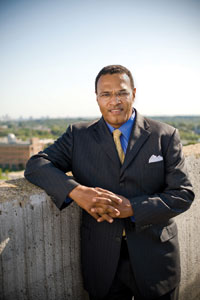UMBC President Freeman A. Hrabowski, III, takes your questions.
Q. What books have you been reading of late? And how do you prefer to read: ebooks or paper?
— James Polchin ’89, political science
Founding Editor, Writing in Public
A. One thing that I’ve been reading lately is Freedom from Fear: The American People in Depression and War, 1929-1945 by David Kennedy, who is a professor at Stanford University (Oxford University Press). This period in American history fascinates me, and both Franklin Delano Roosevelt and Eleanor Roosevelt fascinate me. She was very helpful in pushing the involvement of women, of blacks, and of artists in the American recovery.
Artists were particularly important. It was customary at that time to say: “We are in the middle of a depression. Why would we be doing anything to help the arts?” Yet there were people in leadership positions – including the Roosevelts – who understood that we need the arts in difficult times. Even more so, perhaps, than in times when we are thriving. We need them all the time. The arts reflect who we are. They make us whole. They express the human condition.
The theme of leadership in that era – which was expressed in FDR and in Eleanor Roosevelt – was optimism. People back then said: “The country’s going down the tubes.” They used the same language we use today. Wall Street versus Main Street. Legislation that was pushed through was being questioned by the Supreme Court, and many Americans wanted to see it overruled.
But the language that was used in recovery and the legislation that was passed spoke volumes about our values. In no case was that more true than the Social Security Act. Before that act, the vast majority of people struggled after their working years. There was no retirement. But that act said that we care about people in their time of need.
For me, the optimism and the values we embraced during that era suggest the hope that we can embrace in the period we are in right now.
As far as how I read, I do prefer books. We have every bit of technology you’d want on UMBC’s campus and at my house. But when it’s all said and done, I enjoy the book. I want to smell it. I want to turn the page. I want to turn the corners of the pages. And I like seeing where I am in relation to the end of the book. You don’t get that without the book itself.
Q. As someone who’s been called upon to make a number of commencement addresses at other universities, what is your approach to offering this important reflection for new graduates?
— Richard Byrne ’86, English
A. First, I want to know the history of the institution. And I want to know what students want to know about.
Last year, one of the most significant experiences for me was speaking at the University of Mississippi commencement. So I studied the history of Ole Miss, and discovered that this beautiful grove, with magnolia trees, where we had thousands of people gathered, had been the site where the men of Ole Miss – students and faculty – had set off for the Civil War. That group of men suffered 100 percent casualties in the Civil War. Regardless of what one feels about the Civil War, the thought of those children and men dying is sad. It’s as sad as the war itself.
And then, knowing that 100 years later, this was also the most violent site of desegregation in American higher education. Ever. Four people killed. And there I was speaking to a predominately white audience. I wanted to talk about Mississippi history as part of American history. And about how the problems of Mississippi were – and are – American problems.
The challenge to every graduating class is “What can I do to make some impact on people who don’t have what I have?” That’s what I want to say, whether it’s at Ole Miss or at the University of Maryland, Baltimore, where I will speak this year.
To send a question to President Hrabowski, click here.
Tags: Summer 2012

